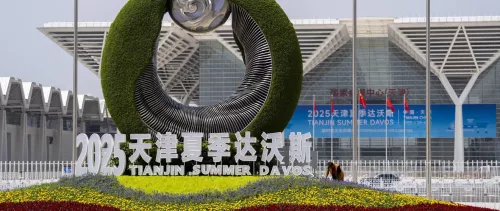
Emerging technologies are transformative forces poised to make healthcare more accurate, accessible and sustainable. | Image: Getty Image/iStockphoto
- Emerging technologies such as AI and machine learning are transforming nearly all industries, including the healthcare industry.
- As the Forum launches the 2023 cohort of Technology Pioneers, we asked selectees the following question:
- How do you see emerging technologies such as AI and machine learning changing global health outcomes?
Emerging technologies such as artificial intelligence (AI) and machine learning are transforming nearly all industries, among them the healthcare industry, which accounts for 11% of global GDP or $9 trillion annually. From the development of drugs and vaccines, to improving medical diagnosis and treatment, such technologies are being used in all stages of the value chain, boosting efficiencies across the overall healthcare system.
As the World Economic Forum launches the 2023 cohort of Technology Pioneers, we asked the six selectees how such emerging technologies are changing global health outcomes. Here is what they said:
‘Prioritizing privacy and security are essential’
Riddhiman Das, Chief Executive Officer, Tripleblind
Emerging technologies like AI and machine learning will revolutionize global health outcomes. These advancements can improve medical diagnosis, treatment and healthcare delivery. AI algorithms can catalyse the rapid analysis of health data, leading to precise diagnoses and timely interventions. Predictive models powered by AI can detect patterns and trends, aiding disease prevention and personalized treatment plans.
However, prioritizing privacy and security are essential. All AI/machine learning solutions must uphold stringent privacy standards, safeguarding patient data and confidentiality. When combined with privacy-enhancing technologies, integrating AI and machine learning in healthcare holds immense promise. Responsible use, coupled with privacy protection, can transform global health, enhance patient care and bridge healthcare gaps for a healthier, more equitable world.
‘AI is expected to bring about an innovation in diet recording’
Logan Kim, Chief Executive Officer, Nuvilab
AI is having a major impact on global health, where personalized data is becoming increasingly important for preventive medicine and precision health.
AI can be used to improve productivity and efficiency by automating tasks, such as diet recording. It can also innovate the user experience by providing personalized insights and solutions. For example, Nuvilab’s AI technology can be used to analyse dietary habits and provide reports on the nutritional intake rate of each menu on personal mobile devices. Patients with chronic diseases, growing children and seniors in care facilities are especially in need of such a solution.
Diet recording in the healthcare industry is commonly operated by the 24-hour recall method, which is quite subjective and has a limited sample size. AI can be used to improve the accuracy and objectivity of diet recording, as well as lower costs. This will make AI a game changer in the field of nutrition and precision health.
AI technology is expected to bring about an innovation in diet recording, and personalized data accumulation will be possible beyond the limitations of the existing diet data. This will open up new insights and provide better outcomes in the global health landscape.
‘We can sculpt a future where quality healthcare is not a privilege for the few’
Andrés Lawson, Chief Executive Officer, Osana
In the face of complex and pressing global health problems, emerging technologies like AI and machine learning are transformative forces poised to make healthcare more accurate, accessible and economically sustainable.
AI and automation provide operating leverage for healthcare institutions, enhancing efficiency and improving outcomes. They can potentially transform healthcare delivery, increasing the supply and scalability of healthcare professionals. For instance, AI algorithms can analyse medical imaging data to identify early signs of diseases like cancer, often with greater accuracy than human doctors and at a lower cost. This allows for earlier, more effective treatment, potentially saving millions of lives.
However, it is essential to exercise forethought to guard against unintended consequences, which means adopting a safety-first, human-first approach in the development and deployment of these models. Technical challenges like privacy, bias and reliability must be intentionally addressed. Collaboration with key ecosystem stakeholders to certify models and develop governance frameworks for Responsible Healthcare General Intelligence is vital.
As we stand on the brink of this exciting new frontier, the vision of a healthier world, buoyed by AI and machine learning, is within our grasp. These technologies hold the promise of a transformative leap in our global health landscape, enabling us to counter medical challenges with unprecedented agility and accuracy. By harnessing AI and machine learning judiciously and responsibly, we can sculpt a future where quality healthcare is not a privilege for the few but a fundamental right for all.
‘AI and machine learning will take healthcare to the next level’
Alicia Chong, Chief Executive Officer, Bloomer Health Tech
The convergence of continuous physiological data on lifestyle and environment is quickly leading to deep phenotyping. By combining this with the power of genomics, machine learning and AI will take healthcare to the next level.
At Bloomer Tech we’ve focused on understanding the cardiovascular system in women specifically, because even with over 30 years of evidence on sex differences, women continue to be harder to diagnose and treat, and consistently experience worse outcomes. Using AI to generate new digital biomarkers will transform this field and impact global health results, particularly for diseases and conditions that affect women disproportionately, differently and even uniquely.
Inspired by the technological transformation that resulted when we transitioned from the limitations of only being able to view photos through chemical processes and film, to enabling accessible, unlimited photos through compact, easy-to-use digital cameras, we are moving in the right direction.
We are pushing to move from existing, valuable though limited biomarkers that can only be viewed via chemical processes in labs, towards using AI trained with reliable data, continuously collected from everyday garments like women's bras.
The impact of ubiquitous access to data will be huge. Being able to read and examine the data when it's needed most instead of just starting a series of tests when it may already be too late will significantly impact people’s health across the world, allowing for proactive and preemptive care.
‘This is the time for computational embryology’
Daniella Gilboa, Chief Executive Officer, AIVF
IVF has revolutionized reproductive care, but it is highly dependent on expertise and experience. The most crucial dilemma in IVF is which embryo has the highest chances of becoming a healthy baby. Embryo evaluation done by experts is based on subjective human analysis.
Let’s leap to the future and consider the alternative: a machine that generates new understanding of developmental milestones, recognizing features that cannot be seen by the human eye, incorporating data from different sources, providing an outcome that’s more accurate than any human embryologist. A personalized treatment. This is the time for computational embryology, letting the machines do what we cannot and working together as a team. Alan Turing talked about machine vs. human. At AIVF we talk about a human-machine team. Let’s team up with our AI models to do better medicine, to provide better care, to lower barriers of entry, and to allow everyone better access to the best care possible.


